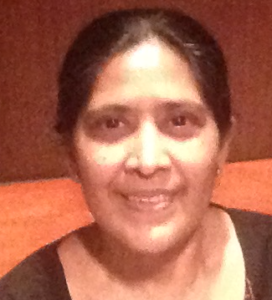Supurna Sinha – Theoretical Physicist

Prof. Supurna Sinha is a theoretical physicist currently working as a professor at the Raman Research Institute. She attained her B.Sc. honours in physics from Jadavpur University in Calcutta and then went on to Syracuse University in USA to complete her MS PhD (a combined Master’s degree and PhD) where she did her PhD. thesis on “Collective Dynamics in Dense Fluid Mixtures.” Her PhD guide Prof. Maria Cristina Marchetti, who was at that time the only woman faculty member in the physics department, has been a great inspiration for Prof. Sinha. To read more about Prof. Marchetti, do read Prof. Sinha’s article Striking the Perfect Equilibrium! in the Indian Academy of Sciences’s Journal Resonance.
Prof. Sinha’s love for physics is a product of the empowering environment she grew up in. Her mother Purnima Sinha was a known face within the scientific community as she was the first woman to attain a PhD in physics from an Indian university. In fact, as far as inspiration goes, her aunts - her mother’s sisters - were all pioneering women in the fields of economics, mathematics, and chemistry. “My world view has been shaped by these exceptionally emancipated women and I have grown up to believe that such women are the norm rather than the exception” (Lilavati’s Daughters). Other than her family, Prof. Sinha was deeply inspired by Prof. S.N. Bose (best known for his work in quantum statistics) who was her mother’s mentor and whose house she would frequently visit as a child. Thus the atmosphere in her house was conducive to her interests owing perhaps to her maternal grandfather, a male influence who changed the profile of her family.
Till the point she received her PhD, Prof. Sinha never faced any gender stereotypes and got only encouragement. It is only after a woman begins to build her career that the problems come up. “Every woman has the same story. There is a veil of prejudice that you are looked through as a woman.” Prof. Sinha acknowledges that small changes are happening and society is slowly transforming. Although she did struggle initially when she began her career, there have been several women and men who have had a positive influence in her pursuit of Science. “Science doesn’t have a gender.” “I think that because women have been denied access in the past, they are often more passionate, sincere, and dedicated compared to their male counterparts. Hardship brings out the best sometimes.”
After so many years of experience, she still sometimes faces stereotypes, but they no longer affect her. However, she does acknowledge that this is only possible once one is established as a scientist. Initially, the discriminatory comments do hurt but her advice to the younger generation of women scientists would be to ignore them. “These experiences strengthen and embolden women. The only solution would be to have a gender balance in the faculty composition of scientific institutes. As long as women are viewed as minorities, they will be treated like they are not competent enough.” There is a need for a fairly equal number of men and women in decision-making positions. At her workplace, Prof. Sinha has seen various changes in the past nearly two decades. Every academic group in her institute now has women faculty members and this is a dramatic change from when she had started her career.
In the future, Prof. Sinha wants to continue pursuing her main area of research : Statistical Mechanics. Some of the projects she is currently working on include solving problems related to Quantum Brownian Motion in collaboration with some researchers at ICTS, testing ideas proposed in her earlier papers with an experimental group, and working on epidemiological models around the COVID-19 pandemic in collaboration with a colleague. She hopes to continue doing research of this kind. Another area she wants to focus on is, popularisation of science. She has written articles for several journals including Resonance and Jantar Mantar, but apart from that she wants to communicate science to a wider audience.
Her main advice to younger women scientists would be : “Pursue your passion in a dogged and honest way. “ She adds, “There are several misconceptions around science being solely a set of logical rules. Logic is one part of science and the other is imagination which equips you to give birth to your ideas. Remember to be grounded but have wings of imagination.” She further advises women to be strong and not let sexism define their views. Due to discrimination, many women’s confidence can be hurt as they often tend to analyse every negative remark. “Fight that. There should be happiness in your pursuit.” In fact, happiness is a big part of Prof. Sinha’s career. Along with her research she does art on the side. “It is imperative that one pursues one’s other interests and talents as well.”
